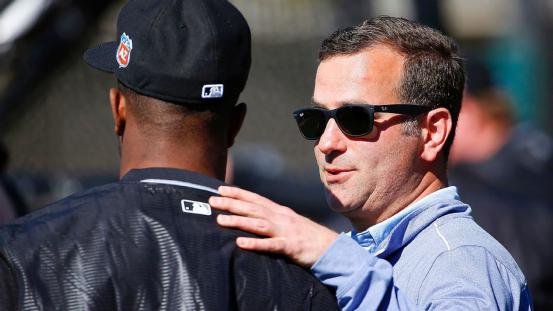- Commissioner’s statement on Ventura, Marte
- Ronnie O’Sullivan: Masters champion ‘felt so vulnerable’ in final
- Arron Fletcher Wins 2017 WSOP International Circuit Marrakech Main Event ($140,224)
- Smith challenges Warner to go big in India
- Moncada No. 1 on MLB Pipeline’s Top 10 2B Prospects list
- Braves land 2 on MLB Pipeline’s Top 10 2B Prospects list
- Kingery makes MLB Pipeline’s Top 10 2B Prospects list
- New Zealand wrap up 2-0 after Bangladesh implosion
- Mathews, Pradeep, Gunathilaka to return to Sri Lanka
- Elliott hopes for rain for Poli
Rick Hahn steers White Sox to faster rebuild
- Updated: May 20, 2016

8:17 PM ET
CHICAGO — A couple of weeks ago in the Chicago White Sox clubhouse, Adam Eaton was ribbing Avisail Garcia about the fact that he was the senior position player in the White Sox organization in service time. Garcia just laughed it off as the White Sox hurried to get on the field and start getting ready for their game.
That might seem a little crazy. Garcia has been with the team since July 30, 2013, coming over in a three-way deal pulled off by Rick Hahn during his first trade deadline as the White Sox general manager. Which brings home something very simple about the 2016 White Sox: This, now, is Hahn’s team.
That’s a meaningful distinction because it’s important to remember the team Hahn inherited after taking over for Kenny Williams in October 2012, especially a lineup relying on past-their-prime veterans Paul Konerko, Adam Dunn and Alex Rios. That first Hahn team lost 99 games, a 22-game decline that might have encouraged other execs to blast down to the foundation and try to earn a genius rep through a slow rebuilding program.
The problem is that wasn’t the job Hahn had taken on.
“We don’t get the luxury of an extended rebuild here,” Hahn said. “Those have been executed masterfully throughout the league, as we’ve seen, which is understandable. It’s just not how we’ve chosen to address things here over the years. The fact is, after the ’13 season, losing 99 games, having what was widely regarded as a bottom-tier farm system, and having several players on the roster who were older, some contracts that were rather sizable, we had to make a choice: Do we go with the five- to seven-year full rebuild? Or do we try to turn this thing a little more quickly?”
Hitting the reset button might bring the benefits of better draft position — and revenue-sharing money – and might protect your draft picks from free-agent investments. But it also risks chasing away fans and sponsors, potentially hampering your ability to maximize your profitability with local revenue.
And doing that in one of the biggest of big markets — Chicago? As an executive, you might ultimately reap some genius laurels. It even worked out for Dayton Moore with the Royals, years after he’d been reduced to a national punching bag by my …
continue reading in source espn.go.com
